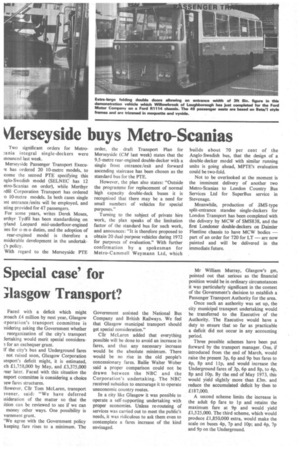Special case' for ;lasgow Transport?
Page 29

If you've noticed an error in this article please click here to report it so we can fix it.
Faced with a deficit which might 3roach £4 million by next year, Glasgow ■ rporation's transport committee is isidering asking the Government whether reorganization of the city's transport lertaking would merit special considerafor an exchequer grant.
If the city's bus and Underground fares : not raised soon, Glasgow Corporation msport's deficit might, it is estimated, ch £1,758,000 by May, and £3,375,000 rear later. Faced with this situation the nsport committee is considering a choice iew fares structures.
However, Cllr Tom McLaren, transport ivener, said: "We have deferred isideration of the matter so that the dtion can be reviewed to see if we can money other ways. One possibility is vernment grant.
'We agree with the Government policy keeping fare rises to a minimum. The Government assisted the National Bus Company and British Railways. We feel that Glasgow municipal transport should get special consideration."
Cllr McLaren added that everything possible will be done to avoid an increase in fares, and that any necessary increase would be the absolute minimum. There would be no rise in the old people's concessionary fares. Bailie Walter Wober said a proper comparison could not be drawn between the NBC and the Corporation's undertaking. The NBC received subsidies to encourage it to operate uneconomic country routes.
In a city like Glasgow it was possible to operate a self-supporting undertaking with proper economies. Unless re-routeing of services was carried out to meet the public's needs, it was ridiculous to ask them even to contemplate a fares increase of the kind envisaged.
Mr William Murray, Glasgow's gm, pointed out that serious as the financial position would be in ordinary circumstances it was particularly significant in the context of the Government's decision to establish a Passenger Transport Authority for the area.
Once such an authority was set up, the city municipal transport undertaking would be transferred to the Executive of the Authority. The Executive would have a duty to ensure that so far as practicable a deficit did not occur in any accounting period_ Three possible schemes have been put forward by the transport manager. One, if introduced from the end of March, would raise the present 3p, 6p and 9p bus fares to 4p, 8p and I lp, and would increase the Underground fares of 3p, 6p and 8p, to 4p, 8p and 10p. By the end of May 1973, this would yield slightly more than £3m. and reduce the accumulated deficit by then to £187,000.
A second scheme limits the increase in the adult 6p fare to lp and retains the maximum fare at 9p and would yield £1,525,000. The third scheme, which would produce £1,850,000 extra, would make the scale on buses 4p, 7p and 10p; and 4p, 7p and 9p on the Underground.










































































































